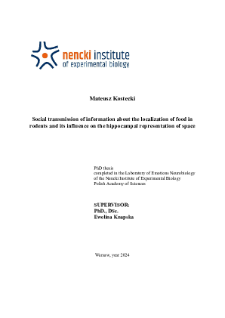- Wyszukaj w całym Repozytorium
- Piśmiennictwo i mapy
- Archeologia
- Baza Młynów
- Nauki przyrodnicze
Wyszukiwanie zaawansowane
Wyszukiwanie zaawansowane
Wyszukiwanie zaawansowane
Wyszukiwanie zaawansowane
Wyszukiwanie zaawansowane

Obiekt
Tytuł: Social transmission of information about the localization of food in rodents and its influence on the hippocampal representation of space : PhD thesis
Twórca instytucjonalny:
Instytut Biologii Doświadczalnej im. Marcelego Nenckiego PAN
Współtwórca:
Knapska, Ewelina (1977- ) : Supervisor
Wydawca:
Nencki Institute of Experimental Biology PAS
Miejsce wydania:
Opis:
85 pages : illustrations ; 30 cm ; Bibliography ; Summary in Polish
Uzyskany tytuł:
Dyscyplina :
Instytucja nadająca tytuł:
Instytut Biologii Doświadczalnej im. Marcelego Nenckiego PAN ; nadanie stopnia: 2024
Typ obiektu:
Abstrakt:
Social partners are an important source of information for animals. By interacting with them, the animals can learn about the properties of the environment such as the presence of mates, food or predators. While we know that rodents have complex repertoires of social behaviors and are capable of transferring information about danger or the quality of food, there is no data on the ability of rodents to gain information about the spatial distribution of resources. The goal of this thesis was to develop a behavioral paradigm, based on the place preference test, to study the ability of rats and mice to detect the source of the food based on the social cues obtained during an interaction with a conspecific. We show that mice and rats can acquire information about the location of food and use this information to guide their exploratory behavior. We show that the potential channel of the information transfer is related to chemical cues emitted in the anogenital region of a conspecific. Using single-photon calcium imaging in freely moving mice, we show that the transmission of a social cue leads to the reactivation of the hippocampal cells encoding the food location and hypothesize that this reactivation may be an instance of planning of the exploratory behavior. Furthermore, we used fiber photometry to measure the responses of the olfactory tubercle, a structure related to the processing of the appetitive aspects of smell. We show that while it responds to nose-nose contacts, its activity increases during interactions with previously fed animals, regardless of whether they provide information about food localization. We also used whole-brain c-Fos expression to find structures potentially engaged in the process of the detection of social cues. We show that two structures - tuberomammillary nucleus and premammillary nucleus may be engaged in the behavior observed in our paradigm. We hypothesize that their role may be related to processing the social cues in the context of the energy balance of an organism and the prediction of energy expenditure. We propose our paradigm as a tool for studying the relationship between social behaviors, spatial navigation, homeostasis and predictive coding of energy expenditure in mammals
Szczegółowy typ zasobu:
Identyfikator zasobu:
Źródło:
Język:
Język streszczenia:
Prawa:
Zasady wykorzystania:
Copyright-protected material. May be used within the limits of statutory user freedoms
Właściciel praw autorskich:
Publication made available with the written permission of the author
Digitalizacja:
Nencki Institute of Experimental Biology of the Polish Academy of Sciences
Lokalizacja oryginału:
Library of the Nencki Institute of Experimental Biology PAS
Dostęp:
Kolekcje, do których przypisany jest obiekt:
- Repozytorium Cyfrowe Instytutów Naukowych > Kolekcje Partnerów > Instytut Biologii Doświadczalnej PAN
- Repozytorium Cyfrowe Instytutów Naukowych > Kolekcje Partnerów > Instytut Biologii Doświadczalnej PAN > Prace dyplomowe
- Repozytorium Cyfrowe Instytutów Naukowych > Kolekcje Partnerów > Instytut Biologii Doświadczalnej PAN > Prace dyplomowe > Prace doktorskie
- Repozytorium Cyfrowe Instytutów Naukowych > Piśmiennictwo
- Repozytorium Cyfrowe Instytutów Naukowych > Piśmiennictwo > Prace dyplomowe
Data ostatniej modyfikacji:
13 gru 2024
Data dodania obiektu:
12 gru 2024
Liczba pobrań / odtworzeń:
9
Wszystkie dostępne wersje tego obiektu:
https://rcin.org.pl./publication/280022
Wyświetl opis w formacie RDF:
Wyświetl opis w formacie RDFa:
Wyświetl opis w formacie OAI-PMH:
Obiekty Podobne
Morgan, Lewis Henry (1818–1881)
Deegener, Paul (1875–1949)
Macdonald, D. W.
Johnsingh, A. J. T.
Chesser, R. K. Sugg, D. W. Rhodes, O. E., Jr. Novak, J. M. Smith, M. H.
Kabzińska, Iwona

 INSTYTUT ARCHEOLOGII I ETNOLOGII POLSKIEJ AKADEMII NAUK
INSTYTUT ARCHEOLOGII I ETNOLOGII POLSKIEJ AKADEMII NAUK
 INSTYTUT BADAŃ LITERACKICH POLSKIEJ AKADEMII NAUK
INSTYTUT BADAŃ LITERACKICH POLSKIEJ AKADEMII NAUK
 INSTYTUT BADAWCZY LEŚNICTWA
INSTYTUT BADAWCZY LEŚNICTWA
 INSTYTUT BIOLOGII DOŚWIADCZALNEJ IM. MARCELEGO NENCKIEGO POLSKIEJ AKADEMII NAUK
INSTYTUT BIOLOGII DOŚWIADCZALNEJ IM. MARCELEGO NENCKIEGO POLSKIEJ AKADEMII NAUK
 INSTYTUT BIOLOGII SSAKÓW POLSKIEJ AKADEMII NAUK
INSTYTUT BIOLOGII SSAKÓW POLSKIEJ AKADEMII NAUK
 INSTYTUT CHEMII FIZYCZNEJ PAN
INSTYTUT CHEMII FIZYCZNEJ PAN
 INSTYTUT CHEMII ORGANICZNEJ PAN
INSTYTUT CHEMII ORGANICZNEJ PAN
 INSTYTUT FILOZOFII I SOCJOLOGII PAN
INSTYTUT FILOZOFII I SOCJOLOGII PAN
 INSTYTUT GEOGRAFII I PRZESTRZENNEGO ZAGOSPODAROWANIA PAN
INSTYTUT GEOGRAFII I PRZESTRZENNEGO ZAGOSPODAROWANIA PAN
 INSTYTUT HISTORII im. TADEUSZA MANTEUFFLA POLSKIEJ AKADEMII NAUK
INSTYTUT HISTORII im. TADEUSZA MANTEUFFLA POLSKIEJ AKADEMII NAUK
 INSTYTUT JĘZYKA POLSKIEGO POLSKIEJ AKADEMII NAUK
INSTYTUT JĘZYKA POLSKIEGO POLSKIEJ AKADEMII NAUK
 INSTYTUT MATEMATYCZNY PAN
INSTYTUT MATEMATYCZNY PAN
 INSTYTUT MEDYCYNY DOŚWIADCZALNEJ I KLINICZNEJ IM.MIROSŁAWA MOSSAKOWSKIEGO POLSKIEJ AKADEMII NAUK
INSTYTUT MEDYCYNY DOŚWIADCZALNEJ I KLINICZNEJ IM.MIROSŁAWA MOSSAKOWSKIEGO POLSKIEJ AKADEMII NAUK
 INSTYTUT PODSTAWOWYCH PROBLEMÓW TECHNIKI PAN
INSTYTUT PODSTAWOWYCH PROBLEMÓW TECHNIKI PAN
 INSTYTUT SLAWISTYKI PAN
INSTYTUT SLAWISTYKI PAN
 SIEĆ BADAWCZA ŁUKASIEWICZ - INSTYTUT TECHNOLOGII MATERIAŁÓW ELEKTRONICZNYCH
SIEĆ BADAWCZA ŁUKASIEWICZ - INSTYTUT TECHNOLOGII MATERIAŁÓW ELEKTRONICZNYCH
 MUZEUM I INSTYTUT ZOOLOGII POLSKIEJ AKADEMII NAUK
MUZEUM I INSTYTUT ZOOLOGII POLSKIEJ AKADEMII NAUK
 INSTYTUT BADAŃ SYSTEMOWYCH PAN
INSTYTUT BADAŃ SYSTEMOWYCH PAN
 INSTYTUT BOTANIKI IM. WŁADYSŁAWA SZAFERA POLSKIEJ AKADEMII NAUK
INSTYTUT BOTANIKI IM. WŁADYSŁAWA SZAFERA POLSKIEJ AKADEMII NAUK




































